Avast ye! Here lie me ooooolode thoughts and those of other people. Ye might think of it as... a collective diary or perhaps a treasure chest buried deep in the sands beneath the olde waters of Davy Jones’ Locker. Read at yer own... risk, matey. Judge not the writing below without the acutest critical thinking, lest you plan on submitting your own fragment to my email account (which you can find on this website).
Below are quick links to pieces by my guests. My own work is embedded if you do the long-scroll below, Web1 style. Thanks!
Below are quick links to pieces by my guests. My own work is embedded if you do the long-scroll below, Web1 style. Thanks!
The Art of Recollection by Nicholas Goodly
February Poem by Sul Mousavi
Poem on 11/23 for Bernadette by Nicodemus Nicoludis
Breakwater by Mina Hamedi
Western Impressions by Chris Molnar
Poems by Ivana Djiya
Impressions by Sarah Jane Collins
Hot (Brown) Girl Summer by Nifath Karim
Bubble Wrap Prank Emails by Chris Molnar
Poem by Jose Carpio
Prose by Ketterick Waddell
It’s been over a year that this page has been neglected—left in the dark, swept under the rug!—in the pursuit of other Web and Real experiences. I see the rise of Substack and now feel the urgent need to Not Do That, but to still put my detritus somewhere harbored from the sheen of the beautiful publications who (incredibly) offer my writing a home.
The Art of Recollection by Nicholas Goodly
February Poem by Sul Mousavi
Poem on 11/23 for Bernadette by Nicodemus Nicoludis
Breakwater by Mina Hamedi
Western Impressions by Chris Molnar
Poems by Ivana Djiya
Impressions by Sarah Jane Collins
Hot (Brown) Girl Summer by Nifath Karim
Bubble Wrap Prank Emails by Chris Molnar
Poem by Jose Carpio
Prose by Ketterick Waddell
Naomi’s thoughts, June 24, 2024
It’s been over a year that this page has been neglected—left in the dark, swept under the rug!—in the pursuit of other Web and Real experiences. I see the rise of Substack and now feel the urgent need to Not Do That, but to still put my detritus somewhere harbored from the sheen of the beautiful publications who (incredibly) offer my writing a home.
This morning I was the only person on Earth. Even in solitude, somehow seeing storm rising West and blue serenely East. I used to be young and imagine that the color of the sky was just a reflection of the ocean beneath because we were surrounded by water where I grew up. Always something brewing over the Olympics; some quiet spring resurrecting its finders one century after another (until soon); if a Great blue heron is the only other one left she will teach me to skewer a fish and I will read her Schuyler. The population in my phone is just OK; Nick Greer’s emerging migraine, Chris Molnar’s long day at the bookstore, somewhere in sweet realm of cute soft angels my dearly departed Betsey Rose wishes she were running down the shore with me. One day, again....
The Art of Recollection by Nicholas Goodly
[[Naomi’s note, Friday, Mar. 24, 2023. Nicholas’s poem speaks into a memory shaped like an orb and accessed through a pinhole. There is a sense of inescapability, as the prose layers atop itself like liquid brocades of silk, and they cast a distance resigned to the ever-haunting, cyclical nature of human existence.]]
I was young it was the house that I remembered where I couldn’t get out wet and sliding my mother dressed like the bed I was these shadows of monsters it began because of the black cats running across the wall tangled into reality I was the strangest thing I was becoming different I didn’t change drastically I was the house I remembered living becoming conscious I couldn’t get out I tried to crawl down this witch I could tell it was my mother I was afraid of outside it was strange I woke up from the dream I was my mother and father I looked at life I sat up and I was sick the bedroom door was there shadows walking shadows of monsters gruesome but defined shapes they were round I woke my dad my father and I had a fever I took me in to the kitchen me up on the counter and he was medicine for me and entryway there was this coat hanger at the coat hanger and black cats running down and crawling at the border where the ceiling meets the coat hanger tangled black it was the dream of reality the thing about right now is change I was a witch my mother was my mother my dad woke my father I had three black cats my entire existence is drastically this
Nicholas Goodly is the author of Black Swim (Copper Canyon, 2022). They are a team member of the performing arts platform Fly on a Wall and assistan poetry editor for The Southeast Review. Nicholas was a finalist for the 2020 Jake Adam York Prize, runner-up for the 2019 Cave Canem Poetry Prize, and recipient of the 2017 Poetry Society of America Chapbook Fellowship, among other awards. Their work has appeared in The New Yorker, Boston Review, BOMB, The Poetry Project, Lambda Literary, Narrative Magazine, and elsewhere.
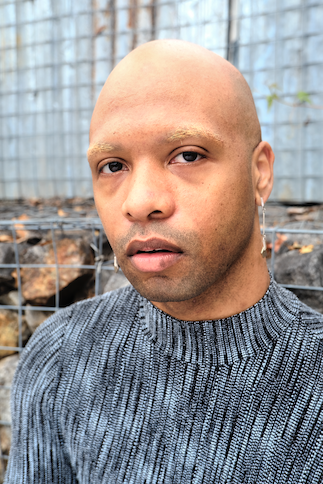
February Poem by Sul Mousavi
February is a month
[[Naomi’s note, Sunday, Feb. 5, 2023. Sul’s poem pays homage to the short, uncertain days of New York’s February, which are melted from austerity into tender ambivalence at the turn of her words. The introspection of the poem mirrors this gradual softening, unfurling like a deep breathe.]]
February is a month
of humiliations. I am
weaker, more trivial, less
generous than I think myself to be.
What is material
remains a major source
of gratification. I am cowardly,
short with friends, not getting enough
reading done.
I even
shave a star into my pubes
with a nose hair trimmer and
it looks like shit.
In February the sidewalks are salted.
If you’re very quiet you can hear it melt the snow.
I love that.
Simple things
carry me; I’m animated
by the substantiveness of what at first
appears slight. The wind blows the salt
against my face. When I lick my lips,
I am tasing the streets. And when I
flick off the last light of the house,
I’m no closer to loving better than I was yesterday.
New York, 2022

Sul Mousavi lives humbly, from moment-to-moment. Sul loves techno and fears God.
Poem on 11/23 for Bernadette by Nicodemus Nicoludis
[[[Naomi’s note, Monday, December 12, 2022. Nicodemus’s work speaks from a brief gap in the forest where the late-Anthropocene meets a yearning for redemption. The topographical, visual direction of his poems (“strolling from faun into oblivion”) seem to document the very last days on Earth, as he whispers a final hymn to the poet Bernadette Mayer. Find Nicodemus’s website here.]]]
I am not asking for a grave
in the planetary scale
or looking for your hands
across a notebook,
but I will nod and say hello
to language, to poetry, to the
maximal space of the page
left blank for you
as
I walk down the street
past your childhood home,
hoping the pigeons
stop midflight and
hand in the air
hiss at the autumn sun
bandaging the moonrise
coming on soon.
And as slow as a seedpod,
uncankered
and undergrown, I trip myself
for the tongue of the
moment.
I do not hold many things
close,
Books are scattered
everywhere
in my apartment
so clumsily one day
they will all burn. And ash-made
the sky itself will become
a giant ampersand.
God
asking more questions
in the final revolution
of hollowed daydreams,
powered, of course, and
gilded,
of course, by the coarse
frost predicted by the weatherman.
Later grief comes
when the body feels
midwinter
pleasurable for a moment.
Then
cascading to the cosmic honor
of
remembrance of life
strolling from fauna into oblivion,
tending the sour garden of
unturning
and blatant joy at the grass
between the yellow brick
row houses.
There is no map now. No
questions left
for the city blocks given
over
the sons of landlords,
the revolutionary heart
blips
for every photograph of friends
just hanging around drinking
Pepsis and doing coke
“A Little Life”, directed by Ivo van Hove and adapted by Koen Tachelet, by Naomi Falk
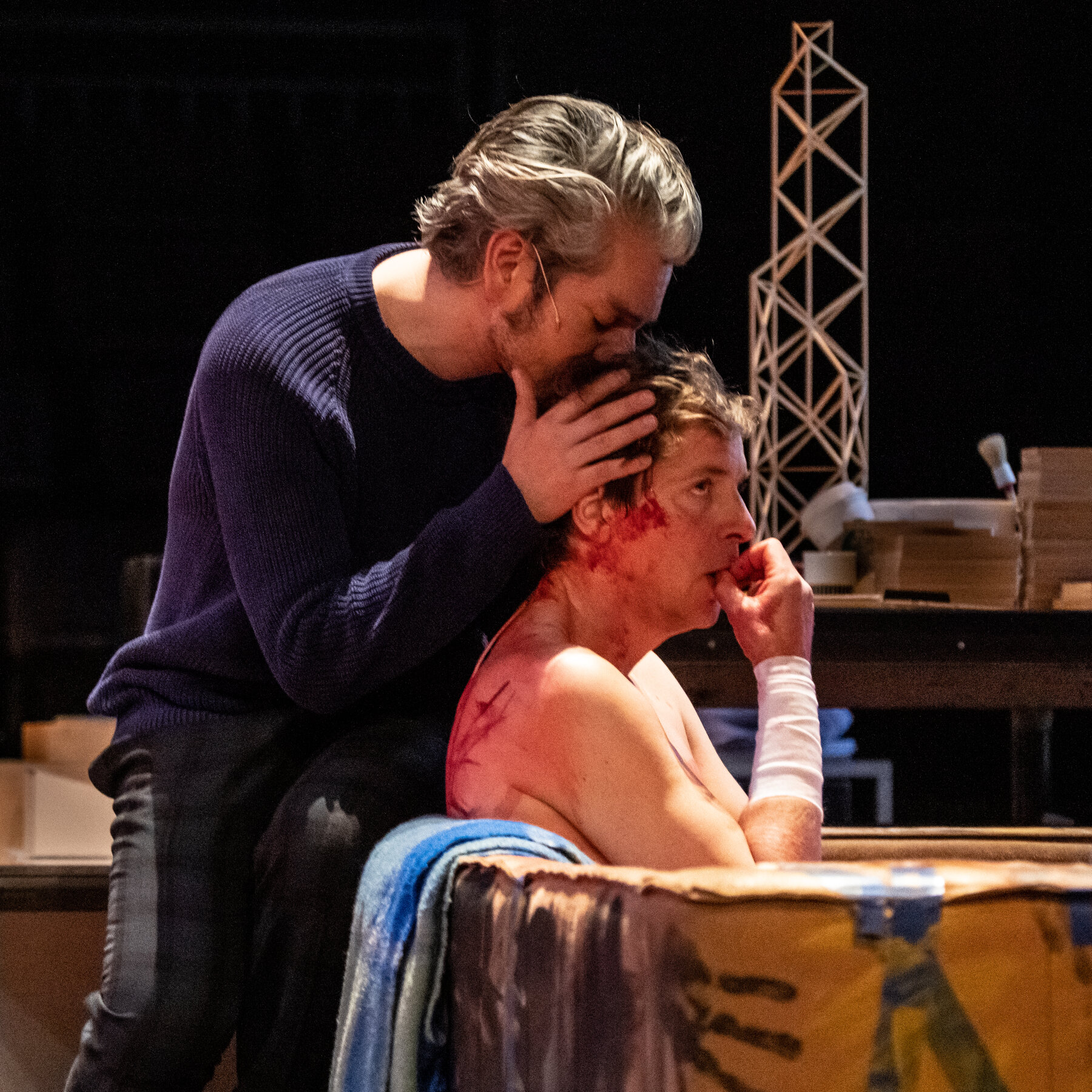
Photo screenshot from Sara Krulwich/The New York Times
Hanya Yanagihara is one of my favorite novelists so if you
hopped on the banal anti-Yanagihara rage train you can probably skip out on
reading this one. I have never written about theater before so either bear with me or don’t. Also this has spoilers!
I left last night’s performance of the Dutch stage
adaptation of A Little Life with ambivalence. Yanagihara’s cinder block
novel follows the life of Jude St. Francis, a man who suffers unspeakable traumas
(discussed at length in the book) that isolate and haunt him for the rest of
his life. He is surrounded by three dear friends and a small support group in New York City who
bear the burden of trying to keep him alive. Somewhat inevitably, it does not
work. I won’t go into details about the
book here because wonderful summaries exist elsewhere.
I would have liked to see more character development around JB,
Willem, and Malcolm. Their significance to each other and in Jude’s life became
somewhat caricatured by their careers—JB the artist and lifelong partier,
Willem the careerist actor, Malcolm the rising starchitect. This was emboldened
by the set design, which had each friend stationed and enacting performances of
their careers throughout the production on the outskirts of the stage. There
were scenes in which I felt this to be quite effective, which I will get into momentarily,
but in general it had the effect of simply reminding us that characters were
alive/present rather than actually developing them. We needed to dig into the
corners of Jude’s relationship to each of them to unearth why chasms and
dependencies later emerged as they entered adulthood. Despite this they were entirely
lovable performances. JB was my favorite and was very sweetly served.
Sophie mentioned the Rothko-ness of the carnelian floor splayed
across the center of the stage. Blood is shed upon this floor in increasingly dark
hues and cleaned so routinely that it becomes a chore and the heartbeat of the story.
The sink under which Jude routinely commits self-harm is emblematic of the
novel and certainly highlights the most prevalent feelings of the story which are
isolation and loneliness. The hardest parts of the play found Jude unfolding
his razor blade from the cloth hidden in the sink basin and shedding blood onto
the stage with the supporting cast in shadows continuing their unrelated activities.
The cyclical pattern of this part of the book was much harder to watch “IRL”
than it was to read. I do think that the props representing other characters in
the play (Andy’s operating table) are somewhat emblematic of how one-dimensional
these characters become in comparison to the heightened trauma that holds the
core of the group together. Which is horrifying but feels true. Helen Shaw’s
review in The New Yorker mentions that the director Ivo Van Hove is “clearly
called to cinema giallo-style works about persecution and abasement,”
and although I cannot comment on Van Hove’s other works, having seen none, I
can say this comparison feels off-putting in the sense that the violent spectacle
of A Little Life is overshadowed by the felt horror and trauma it creates
(not the case with giallo as a genre). And this is one of the points of the
work.
Jude’s backstory is presented alongside his adult years (as
it is in the book), and elements are slowly revealed as he grows older. Brother
Luke is a recurring character whose presence is felt throughout and foiled by
the social worker who becomes somewhat of an angel-narrator on Jude’s shoulder.
The vile characters from Jude’s past are never far from the sweet ones—his
adopted father, his doctor—which only reminds of the reality of his life, which
is that any semblance of happiness is fated to be only felt in a glimpse.
My favorite part about Yanagihara’s writing is her
omniscient narrativizing, when she peers from within a character’s heart toward
the grander scope of a life they have not yet fulfilled. She collapses people
into their futures to create an immediate sense of regret, joy, or sorrow. I
told several of my friends in a group chat earlier that this particular POV is
one that cannot be identically translated into performance, whether in person
or on-screen. Those moments were missing from Van Hove’s production, and as a
person surrounded by artist of other mediums it felt emboldening to be reminded
of the unique power of literature.
I loved the various aromatics released throughout the play,
as I feel scent is such an underrepresented sense across art forms. There are
obviously huge parts of the performance which I won’t comment on because I am
not aware enough to pass judgements (like the minute and intricate details of
the acting, lol).
Overall the performance was a marathon of grief that I struggled to endure. While I do not think the suffering is gratuitous I don’t think it translated appropriately to the stage. I certainly would not recommend seeing this.
A small portion of the audience departed at the
intermission. I could not believe that the man who sat down next to us did not
know what the play was about and hadn’t researched it before he came to the
theater that evening. That was a little bit funny!
Overall: 6.5/10.
Breakwater by Mina Hamedi (@minahamedi)
There are two directions I can take, but I always go to the left first. The rain has stopped for now, the tides are violent in the aftermath. I tread on the concrete, then walk softly on the damp, packed sand. There are small bones with black, white, and gray feathers scattered toward the shallow water. Most of the feathers have been scraped off. I pass the basketball courts, doors left open, and approach a glaring of cats. Some are huddled together, with the kittens behind them in the breakwater rocks. Others lay solitary on the path. I take the path that leads out of the marina, the rocks lining each side as the water flows between them. I hear calls from between the boulders, a black cat twists between crevices. She sees me but does not retreat.
[[[Naomi’s note, Wednesday, September 7, 2022. Although Mina Hamedi’s prose is even with tranquility, its underlying sensibility is stormy, bewitched, and oracular. She is a writer of knowing and smokey substance; she tends her language under twilight. Her short essay entitled “Breakwater” recalls perceptions from the coast of the Marmara Sea, where she grew up.]]]
There are two directions I can take, but I always go to the left first. The rain has stopped for now, the tides are violent in the aftermath. I tread on the concrete, then walk softly on the damp, packed sand. There are small bones with black, white, and gray feathers scattered toward the shallow water. Most of the feathers have been scraped off. I pass the basketball courts, doors left open, and approach a glaring of cats. Some are huddled together, with the kittens behind them in the breakwater rocks. Others lay solitary on the path. I take the path that leads out of the marina, the rocks lining each side as the water flows between them. I hear calls from between the boulders, a black cat twists between crevices. She sees me but does not retreat.
Black ducks float with the waves by docked fishing boats, seagulls wail and drink water from puddles. I walk back to the main pathway and see the cargo ships in the distance, waiting for passage through the Bosphorus. There are lines of navy, red, and white, and they always anchor a good distance away from one other. This shore twists so much that you can see it clearly from above. I can always recognize its shape on maps. Then I trace a specific point to the second row of houses from the seaside and find the contours of where I grew up.
I walk to the second path that stretches out and into the water, making a vow to bring my best friend here. The colors will remind her of home. Water finds its way above the breakwater rocks.
I start heading to the right, to take a photograph of my grandparents’ house that stands just a few feet away from the water behind a short ivy-covered gate. The mint tip of the adjacent greenhouse is visible now after the rain.
The second path is home to only one cat, who sits at the edge, right before the breakwater rocks. She's a calico, her white fur grayed, matted, and patterns muted. As I get closer her ears change angles. Her mouth opens slightly but I'm still too far to hear the sound she makes. She reminds me of my own calico cat, whose yelps I first heard out in our garden when she was a sick kitten.
There’s a hierarchy among these seaside cats. Maybe this one prefers to be alone, or was forced out of her clowder. I’m an observer of their lives, their interactions. I get to peer into their homes and alter their routines.
There is no other place quite like this shore. It reminds me that I am a descendant of it, that I was nourished by it and then I moved away. When I return, I imagine I’m among spirits, breathing the same air, or at least a small part of what is left. When the drops from waves sprinkle over my feet and I can barely discern islands in the distance, the future is not here.
Western Impressions by Chris Molnar (@stationsofthecrass).
![]()
What they don't tell you is that what happens outside Vegas stays outside Vegas. You can form the words but they drip off your tongue like so much condensation. Only the people of Las Vegas know the true meaning of news and trends, which is nothing. The only truth in this world is the sun, the water trickling from far-off streams. Serious, eternal pleasure; earned and won.
[[[Naomi’s note, Thursday, June 28, 2022. Chris Molnar wrote “Western Impressions” in 2014, after moving from Manhattan to Las Vegas to open The Writer’s Block, the very first independent bookstore in the city’s history. This piece of writing is an homage to a place where icons stand tall and where, as he writes, “cosmic emptiness… sets it apart even from the great metropolises.” Molnar is one of the best writers I have ever encountered, and “Western Impressions” speaks to the welling shades of melancholy and deep gold that whisper throughout his body of work.]]]
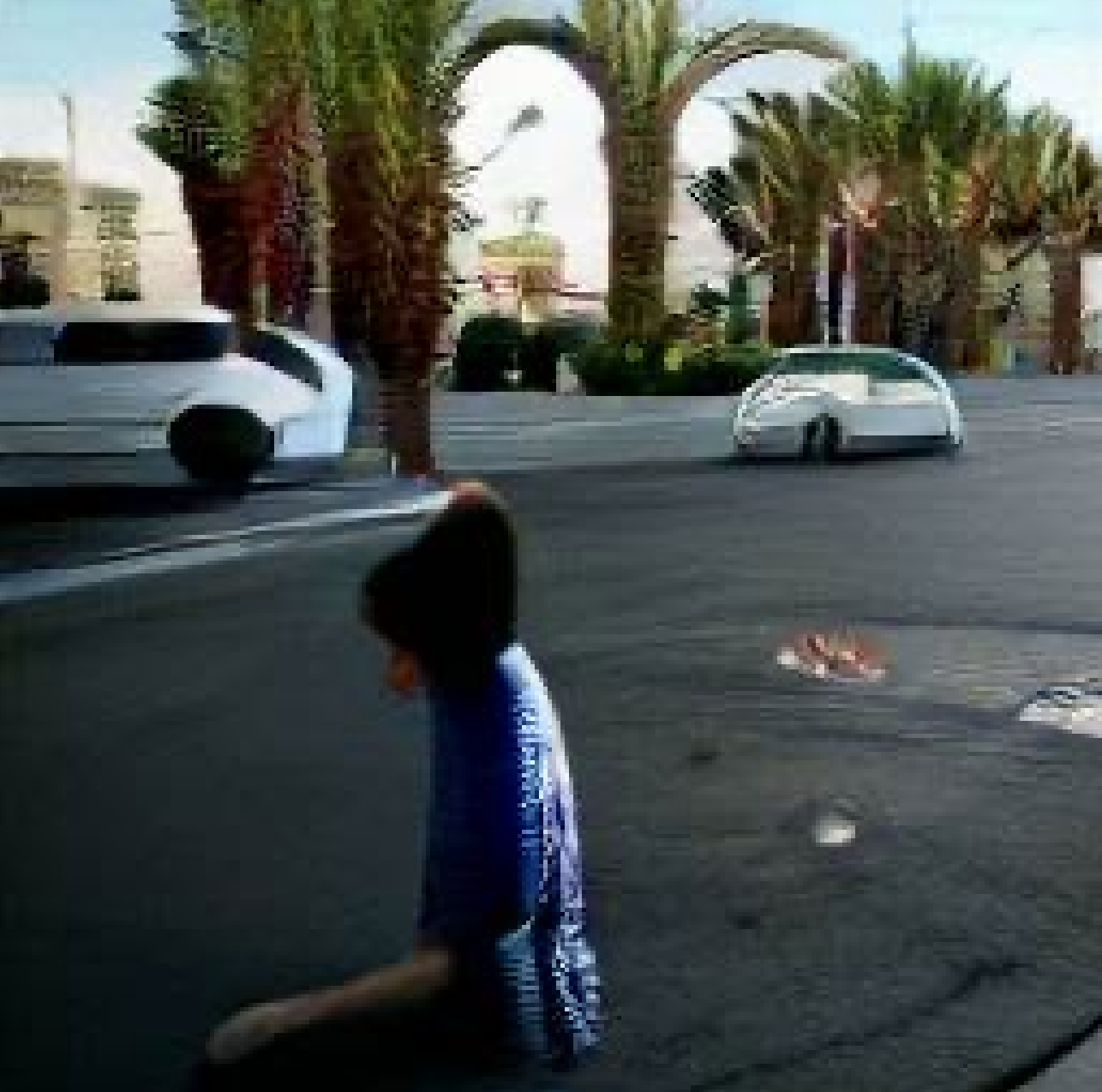
What they don't tell you is that what happens outside Vegas stays outside Vegas. You can form the words but they drip off your tongue like so much condensation. Only the people of Las Vegas know the true meaning of news and trends, which is nothing. The only truth in this world is the sun, the water trickling from far-off streams. Serious, eternal pleasure; earned and won.
In Vegas there are streets folding off into haze under lazy, blinking lights. Friends and tourists wander in eccentric circles beneath mountains and starry slopes. Slurry rocks in the valley and dry windy pines above. Prostitutes and methheads abandon one precinct for another and the rich scent of history and absence fills the lungs, musty and strong and decayed.
The warm air creates an unbridgeable space between car and car, between lone figures laughing and lone figures quietly walking off into the distance. Every lone figure is inheritor to a tradition of mercenaries and scouts; shadows on horseback.
All of them stand behind an abandoned motel, shoes dusty in gravel and dirt, plotting and smoking, drinking and preparing. What happens in Vegas stays in Vegas. Every revelation is a secret on a cosmic scale, and Vegas is nothing if not cosmic.
Like anywhere worth living, it's a desperate place to escape and a relief to finally find. The sort of safe harbor that lets the outcast live with a chance to succeed or die with some dignity in a place with a supreme tradition of rock bottom. It exists far above its size, a world alone like New York or Mexico City.
Yet no one knows. The divide between what happens in Vegas and what happens outside is complete. There is cosmic emptiness, there is an ineffable distance and absence, that sets it apart even from the great metropolises. Stretches of such silence that still reverberate with strangeness and humanity. The photo negative of the great sprawling cities, where the action is in the overwhelming quiet.
The lone figures gather, muttering in that space behind the abandoned motel, drinking in the empty lot. I feel safe, says a lone figure, because everything is desirable here. Ugliness and beauty, death and power. Decay and development. Only here is there room and the precedent, infinite prerogative and need. The requirement of lost youth. The sun sets behind the lone figures and they go their lone ways. All that's left is the wind chattering voices through cranes and rubble.
June 7, 2022.
Notes to myself: I am thinking about the struggles I’ve faced as a publisher over the past five or so years. Obviously Big-4 (5?) senior mgmt isn’t comparable to small, unpaid publishers who work for the sake of generating and locating self-expression. There is no motivation of financial gain for us! I publish other people’s work in a range of mediums and genres: long (Crop Circle, Archway, MoMA, past galleries), mid (NAUSIKÂE), and short (here). Longer forms assume a level of trust between publisher and writer or artist, whereas mid and short forms are more in the vein of dipping your toe into the water, for both parties. I came to publishing as someone who has broad experience on the other side of the exchange, and have found most of my interactions with editors and publishers to be rewarding and amenable. Publishing book-length work in regards to my own projects is not always as easy. There are so many moving parts and people being depended upon (photographers, contributing writers, editors, proofreaders, all of whom are usually working for free because we are only subsidized by our day-jobs). This is all to say: the issue of finances is the fundamental one, and as I move into publishing art books it obviously effects the quality of the color and feel of the work. Maybe one day these ventures will be backed by appropriate resources to bring ideal paper and printers into the pictures. For now, I am grateful that even in such a small number of years I have found a vast range of talent to involve in these hilariously strong-willed productions. Thanks everyone!
Poems by Ivana Djiya (@localhotdad)
![]()
![]()
[[[Naomi’s note. September 22, 2021. Today is sweet Ivana’s twenty-third birthday. Later tonight I will see her and smooch her ethereal face, though for now, let me introduce you to some of Ivana’s poems that read like silken incantations cast into the walls of the writer’s bedroom. Here are moments from a life of unrest, genesis, promise: the solitude of a perpetual dusk.]]]

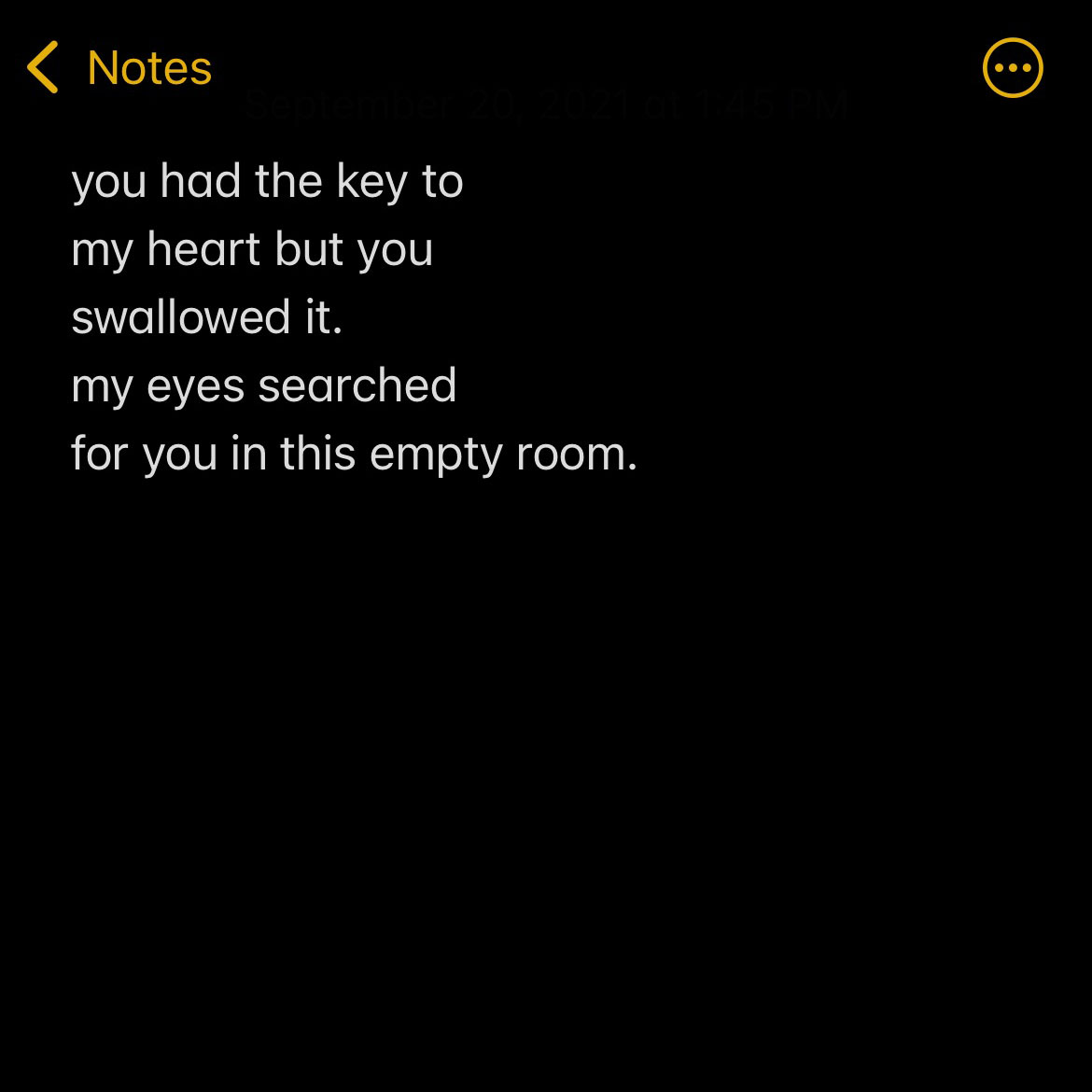
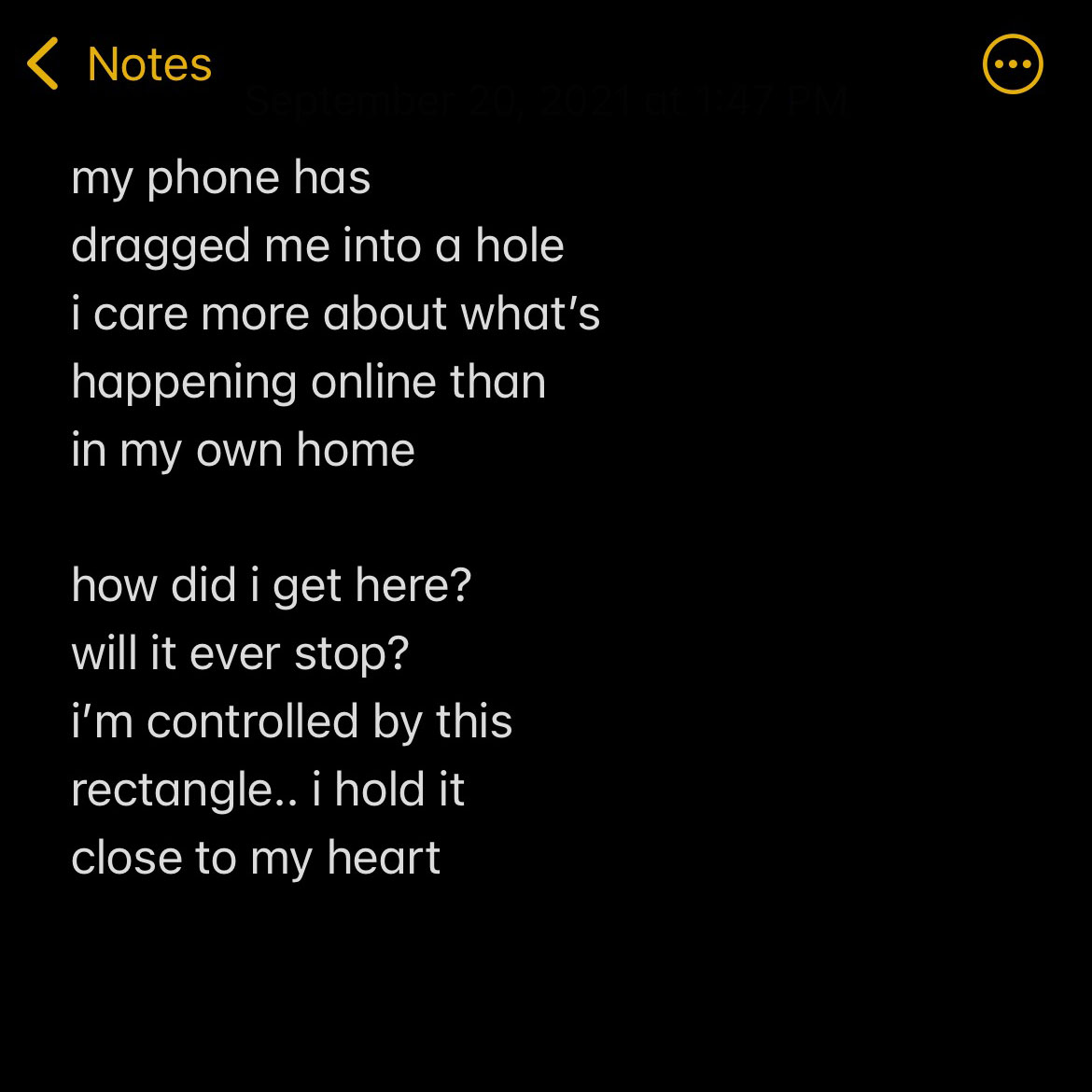
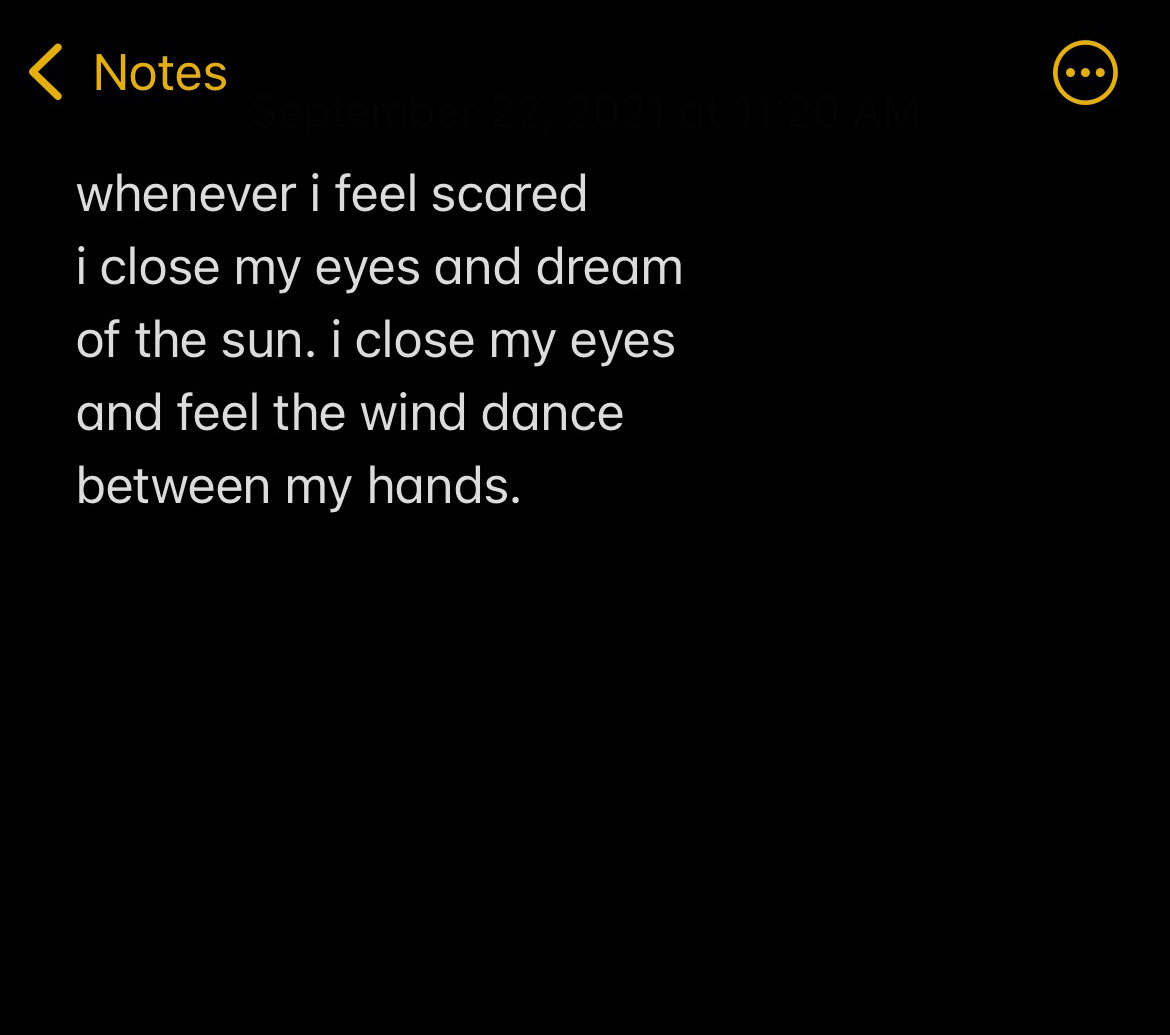

Impressions by Sarah Jane Collins (@sarahjanemaree)
[[[Naomi’s note: June 22, 2021. On the occasion of our dear SJ’s birthday, I’d like to publish
a poem she sent me in thick of spring. I love it for the obvious reasons that I
might love a poem—it deals in visual art, the sensuousness of the human body
and how it also imprisons us—but also because of its narrative unwillingness to
focus. She reminds of one of my favorite poets James Schuyler (1923–1991). The
two find kinship in a constant reorientation between the personal and the
immediately perceived; a tender impulse to be in constant, private wonder of
the circumstances of one’s own life.]]]
[[[Naomi’s note: June 22, 2021. On the occasion of our dear SJ’s birthday, I’d like to publish
a poem she sent me in thick of spring. I love it for the obvious reasons that I
might love a poem—it deals in visual art, the sensuousness of the human body
and how it also imprisons us—but also because of its narrative unwillingness to
focus. She reminds of one of my favorite poets James Schuyler (1923–1991). The
two find kinship in a constant reorientation between the personal and the
immediately perceived; a tender impulse to be in constant, private wonder of
the circumstances of one’s own life.]]]
there was
fog hanging
in the sky
as I streaked
from New
York for the first
time in a
while, away from
you
and
all the
things you
make me feel
the long fine fingers on Degas’
brother’s hand
the veins
running gentle under his
fragile
skin
in
tracts
calling
back
to when I
knew
what it
was to push the
prints of my
tips into the spaces between your thin
bones
smooth
and taut like the glass of this bay I’m
sailing on by
back where
the metal mountains stop the sun
you’re
somewhere
but
I won’t ever know where again
and I’m
numb
or at
least
I thought
I was
a kind text
that takes me by surprise
the
cherries in Manet’s model’s grasp
the way
the Normandy coastal path
looks just
like
Straddie
or maybe Caloundra
where the ribs
of a ship are eaten
by sand
and sun
scatters dizzily, opening the way
Monet’s
caught it here
Turner sinks
the bodies of the enslaved into a sea
the
pinks and creams
of the condemned late afternoon
a reminder
of the wretchedness
of my flesh
And there
is quiet on the rug
where
Sargent
renders little rich girls between
two urns
filled
with notes and favors
left
behind
for curators to find
on the way
home I chase the sun west and think
of how I
miss your warmth
but then I
remember
how
fleeting
it really
was
Hot (Brown) Girl Summer by Nifath Karim. (@nifathkarim)
[[[Naomi’s note: February 17, 2020. Nifath is a writer and is also my friend. She sent this to me over the weekend. I composed a long, tumbling list of reasons why I like this work, but I’d like to highlight 1) its sense of humor which is as biting as it is patient and 2) its effortless structure. I frequently have a hard time stomaching narrative prose, because the thing that leads to the next feels contrived. Not the case here. Plz enjoy <3]]]
[[[Naomi’s note: February 17, 2020. Nifath is a writer and is also my friend. She sent this to me over the weekend. I composed a long, tumbling list of reasons why I like this work, but I’d like to highlight 1) its sense of humor which is as biting as it is patient and 2) its effortless structure. I frequently have a hard time stomaching narrative prose, because the thing that leads to the next feels contrived. Not the case here. Plz enjoy <3]]]
Tonight is warm and my Uber driver has just dropped me off
somewhere in Brooklyn. I am standing right now in the middle of the street,
poised to be run over, trying to find anything that resembles a functional door
on this broken block. My phone beeps and New Boy texts me again, this time it’s
a Boomerang of him wielding a lightsaber over his crotch. I groan and keep
looking for the door to his apartment and find it wedged between an
unpleasantly graffitied wall and a boarded up Chinese takeout spot. There is
light inside the Chinese place, it is bright and yellow and I realise it is the
only source of illumination on this street. I think I can hear screams and
laughter and silence in there all at once and I urgently buzz for New Boy to
let me in.
There are
shoes, far too many, just outside the door to his apartment. I stop to count
them before I knock— twenty-two pairs,
plus several singles grouped sadly in the back. They’re
mostly sneakers, but I count three pairs of dress shoes gathering cruel levels
of dust on them. It reminds me of funerals back home when everyone would take
their shoes off, stacking them on top of other shoes forming a filthy pile for
people to dig through later, dupattas wrapped around their heads, packets of
tehari in hand. Ammu would always put her sandals in a little plastic bag and
carry it around with her and taught me to do the same. She didn’t
like touching other people’s shoes, she said
all the dirt in the world collects under them. Duniyaar Moyla.
I knock and
New Boy opens. He looks just like his photos, tall and pale with shiny black
hair that is just shy of being greasy. His eyes take me in, my too-short
shirtdress that would make Ammu faint, my hair bleached to oblivion, glitter
falling from my lids when I blink. I know he is thinking about what I look like
under my dress and I feel a sudden thrill at the realisation that I am about to
be touched by someone who isn’t You.
It’s
a very small apartment, three bedrooms are almost squashed into one another,
separated by walls thin enough to be poked through. I sit on the couch in the
living room, my knees uncomfortably tucked behind the coffee-table positioned
too close to me. New Boy gets me water in an emptied jar of pasta sauce, the
label hasn’t been peeled off properly. I pick at
it while he talks to me, telling me about his life and work and the time he
smoked weed in Africa and in Cuba and how much he wants to go to India and
smoke weed on the mountains. He looks at me at this point, hoping I will say
something like “Ah yes, India, where I fed goats and
played with cattle and did yoga naked.”
Instead
I say “That
could be cool. I’ve never been to India.”
“Oh,
wild. So you’ve like, never been to your homeland?”
“Uh
I’ve
been to my homeland, it’s just not India.”
“Oh.Oh.” He pauses, thinks
and says “word.”
I spot a
bottle of vodka on the table and gesture towards it.
“I
want you to tell me where I’m from and for
every wrong answer you will do a shot.”
He is
almost too eager to get drunk and three shots later (Pakistan, Guyana, Sri
Lanka) I tell him he can use Google for help while I use his restroom. Like the
rest of the apartment this too is tiny and cramped, and I have a hard time
imagining him sitting on this minuscule toilet. There’s
no hand soap, just a bottle of face cleanser that is clearly being used beyond
its potential. I stare at myself in the spotty mirror, bored with how good I
look. I am struck suddenly by overwhelming anger at You for leaving me, leaving
my face and my body, leaving me with no choice but to stand in this awful
bathroom in this terrible apartment with New Boy who I am sure can’t
say my name right. I think of the last time You said my name and it fills me up
with crazy hurt.
When I walk
out of the bathroom he is jubilant. “Bollywood!”
he
exclaims. I smile sadly, say “you guessed it!”
and
lead him into his bedroom. He starts taking my clothes off, his fingers
pinching at the fabric like he is touching salt. He is so pale under his shirt,
I can almost see through him. When he finally takes my bra off he says “Oh,
wow”
but
not in the way You’d say it, more like “Oh
wow—brown.”
We exchange
sexual pleasantries for the next ten minutes, him pestering me with several
variations of “does this feel good”
while
I respond with sounds that keep me from having to talk and lie. His bed creaks,
actually squeaking like it does in movies and TV shows when sex is being
suggested but not shown. Your bed never made a sound and I wonder if it was
because our sex was never this athletic, or if your bed was just constructed
better.
When he’s
finished he pulls me close in a surprisingly tender embrace and starts snoring
almost immediately. He smells like You, he uses the same deodorant I think. I
detach myself and sit up, looking around the room. I spot the lightsaber
leaning against his closet door. It looks like a toy and I am tempted to put it
away, to clean up this room with too many things on the dresser, too many
clothes on the floor, too many books untidily stacked on his table. I think of
Ammu cleaning my room, the way she’d
arrange books by size, hang clothes by color, put all my dumb knickknacks into
neat groups on my dressing table. He keeps snoring and I get up, start folding
and clearing and arranging. When I’m
done I stand back to look at my handiwork and I wonder how I ended up here,
mothering this man who feels like a child. He sucks on his thumb and farts in
his sleep. I dress quietly and walk out of his room. I can hear one of his
roommates using the bathroom so I wait on the couch.
I open
Messenger on my phone and scroll down, down, down until I find my last
conversation with Ammu. It was right after I told her about You, almost a year
ago, and she’d insisted I end it or I would never
hear from her again. I open the thread and read the messages I haven’t
looked at in forever—me explaining how wonderful and
perfect you were in your non-Islamic, non-Desi-ways, her texts angry and short
and full of warning of the dangers of Bideshi Boys. I look at her profile photo
and realise it’s changed since the last time I saw
it. Since the last time I saw her.
The
roommate steps out of the bathroom and spots me on the couch. He’s
shirtless and very blond, the hair on his chest looks like dust. We smile and
he approaches me.
“Hey.”
“Hi.”
“You’re
that Indian chick he’s been talking about.”
“I’m
not Indian. But I probably am the chick in question.”
“Oh,
word! My bad.”
He looks at
me like he wants to flirt but isn’t
sure how to do it. I get up and walk past him into the bathroom. I look at
myself in the mirror like I’ve done so many
times after we’d have sex. I would glow then but now
I feel hollow and a little tired from cleaning his room. I suddenly want to
cry. I want to call You and cry. I want to call Ammu and cry.
When I step
out of the bathroom the roommate is sitting on the couch, he looks at me like
he has a plan of action now.
“You
know we couldn’t figure out how to say your name, so
we just call you Hot Brown Girl.”
“That’s-nice.”
“So
like, where are you from then?”
I eye the
vodka on the table and rethink it.
“Bangladesh.
I’m
from Bangladesh.”
Written by Chris Molnar. December 20, 2020. Well, today happens to be Chris’s birthday. He sent this to me with the description: “prank e-mails i sent to powerhouse's listing for free bubblewrap once to mess with a co-worker!”
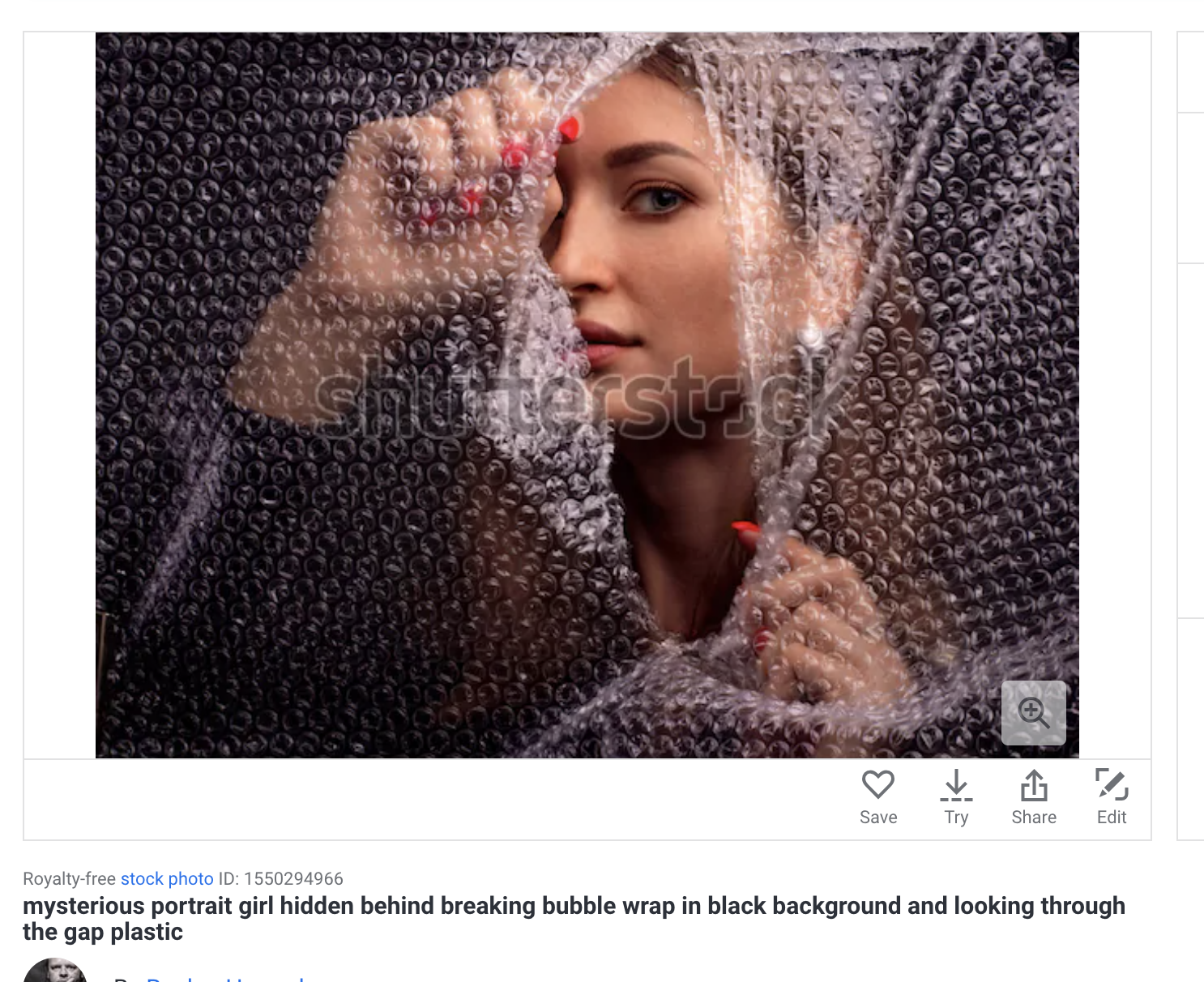
#1
hello i have a special interest in
sealed air and your offer is very intriguing.
please tell me the contents of this bag and a good time for to come by
and perhaps feel inside and look at what I can touch
#2
are bubbles big or small I do like
both ways but prefer large this has good feel when I press down
#3
from this picture it does look to
me that there are papers and other items can I leave this with you
maybe I pay you money to do this
perhaps four
#4
yesterday I arrived at your closing
time of 7 and waited for one half an hour but I did not see any worker although
I did see this bag of material and did look at it through glass and these used
bubbles do tempt so
#5
I do not understand why you told
me this bag was already gone it is there.
it is cruel and I will pay you perhaps eight dollars although your list
does say free and I will return. please
tell me bubble wrap books thank you
#6
i did take the train two hours to
the copy center where they do let me buy new wrap it is not so used as yours
too firm to touch and cold factory.
please I do not know why you do not let me take your wrap, I saw it was
gone in the shop, you do not write. it
is soft at my house and I think you could enjoy the good feel but when I come
in they told me I cannot ask for you.
there is a tree with bubble wrap on the top leaves and that is where I
live, please come
Written by Naomi. December 2, 2020. I went to locate a day in my life in my notebooks and found that there was a gap, that between finshing one notebook and receiving another (as a gift for my bday, from Mina in November 2019), that nothing exists to prove that I had something to say about my life at that time. I do remember documenting a particular day when I thought intensely about this one Giacometti sculpture that I liked. Then I had curry (Japanese) later for dinner and had a strong convergence of emotion. Perhaps what I wrote was in my notes (iPhone) or on my laptop (Word Document) or on my iPad (Pages Document), but at this point I don’t think I’ll get to the bottom of it. I keep thinking that the archives of earlier writers, in more analogue times, were more linear and indicative of the “narrative” of an artists life. So when their “papers” were posthumously uncovered, the pieces were more or less arranged to form the story of some decades. Now what do we have? Occasional IG post. Memory of a dream at five in the morning. Dismembered story because none other can now exist.
Written by Jose Carpio (@dr.carpio), published May 26, 2020.
I sat in the stairwell one evening trying to tear my phone in half.
Weighty and compact, its front and back glass panels did not bend. Its rounded metal edges brushed off the force of my twisting wrists, nullifying all my effort.
I continued to twist, wanting to see if I could get to the inside of something (anything), but the outside would not give.
I imagined that the evidence of my force was inside the phone: computer parts mangled by torsion.
Corollary: I imagined my body hitting the water, insides disarrayed, like a dumpling.
My body hitting the water, a distant dream.
By Naomi. March 25, 2020. Today is quiet, and in conversing with myself again I find that hues of maroon have become enriched, lightened around the edges and deepened in the middle. I wonder if those folks will find me at the outgoing tide of the lake, bathed in rubies, and if you—of my imagination, always coming and going—would consider me more me today than yesterday, than last spring, than this past autumn. Some seasons stick around longer than others, and for the most part we dive in and out of loss like visitors to the Earth. You should always express what you believe to be true. Remind me of that tomorrow in the morning in the light. When I woke up this morning, I was dazzled.

